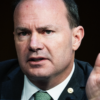Americans are closely divided on the question of being compelled to celebrate same-sex marriages, according to a recent survey by the Pew Research Center.
Those surveyed split evenly on whether wedding-related businesses should be required to provide services to same-sex couples, regardless of religious objections the business owners might have.
A total of 49 percent agreed, while 48 percent disagreed.
Frequency of religious attendance was one significant factor in determining respondents’ views, according to the survey published Wednesday.
Sixty-three percent of weekly churchgoers, including 88 percent of white evangelicals, said business owners should be allowed to refuse service for same-sex weddings if they had religious objections.
“When there is significant difference of opinion on hot button issues, it is all the more important to protect religious freedom and religious accommodation.”
—@Heritage’s Roger Severino
Among less frequent churchgoers, just 42 percent believed the same, including 34 percent of religiously unaffiliated Americans.
Those surveyed also were divided on the issue of which public bathrooms transgender individuals should be allowed to use.
Fifty-one percent agreed that transgender people should be allowed to use the public restroom for the gender they “currently identify” as, while 46 percent said they should use the bathroom that corresponds with their biological sex.
On birth control, the survey found that 67 percent agreed employers with religious objections should be required to provide it in employee insurance plans.
However, Roger Severino, director of the DeVos Center for Religion and Civil Society at The Heritage Foundation, questioned the value of the findings.
“When there is significant difference of opinion on hot button issues, it is all the more important to protect religious freedom and religious accommodation,” Severino told The Daily Signal in an email. “But unfortunately, these polls are of limited value because the questions were subtly biased against religious liberty.”
Biased or leading questions can affect survey results drastically, he said.
The question regarding provision of wedding-related services to same-sex couples asked:
[Should] businesses that provide wedding services, such as catering or flowers … be able to refuse those services to same-sex couples if the business owner has religious objections to homosexuality?
“The religious objections aren’t to homosexuality generally,” Severino said. “Rather, the conflict is limited just to the forced celebration of same-sex unions against a person’s beliefs.”
A question regarding employer coverage of contraception was worded as follows:
If you had to choose, which comes closest to your view? Employers who have a religious objection to the use of birth control should be…
ABLE TO REFUSE to provide it in health insurance plans for their employees
REQUIRED TO PROVIDE it in health insurance plans for their employees, just as other employers are required to do?
“The question … implies that religious groups are seeking exemptions to requirements imposed on all employers, when in reality the coverage requirement does not apply to one third of all businesses and nearly 100 million people,” Severino said.
The Pew Research Center poll, taken in August and September, surveyed a randomly selected, nationally representative group of 4,538 adults. The margin of error was plus or minus 2.4 percentage points.



























